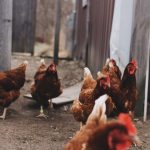Proper nutrition is essential for the health and productivity of chickens. Just like humans, chickens require a balanced diet to thrive and reach their full potential. A well-balanced diet not only ensures that chickens are healthy and free from disease, but also plays a crucial role in their egg production and overall growth. Without the right nutrients, chickens may suffer from stunted growth, poor egg quality, and a weakened immune system. Therefore, it is important for chicken owners to understand the nutritional needs of their flock and provide them with the appropriate feed to support their health and productivity.
In addition to supporting the physical health of chickens, proper nutrition also has a significant impact on their mental well-being. Chickens that are well-fed and receive the necessary nutrients are more likely to exhibit positive behaviors, such as foraging, dust bathing, and socializing with other members of the flock. On the other hand, chickens that are malnourished or lacking in essential nutrients may become lethargic, aggressive, or exhibit abnormal behaviors. Therefore, it is crucial for chicken owners to prioritize proper nutrition in order to ensure the overall well-being of their flock.
Table of Contents
Essential Nutrients for Chicken Health and Productivity
Chickens require a variety of essential nutrients to support their health and productivity. These nutrients include protein, carbohydrates, fats, vitamins, and minerals. Protein is particularly important for chickens, as it is essential for muscle development, egg production, and overall growth. Carbohydrates provide chickens with energy, while fats are necessary for maintaining healthy skin and feathers. Vitamins and minerals play a crucial role in supporting the immune system, bone health, and reproductive function in chickens.
In addition to these macronutrients and micronutrients, chickens also require access to clean water at all times. Water is essential for digestion, temperature regulation, and overall health in chickens. Without an adequate supply of water, chickens may suffer from dehydration, which can lead to a range of health issues. Therefore, it is important for chicken owners to ensure that their flock has access to fresh, clean water at all times in order to support their overall health and productivity.
Best Feed Options for Chickens
There are several different feed options available for chickens, each with its own advantages and disadvantages. Commercial poultry feed is one of the most popular options for chicken owners, as it is formulated to provide chickens with a balanced diet that meets their nutritional needs. Commercial feed is available in different formulations depending on the age and purpose of the chickens, such as starter feed for chicks, grower feed for young chickens, and layer feed for hens. This makes it easy for chicken owners to provide their flock with the appropriate nutrients at each stage of their development.
In addition to commercial feed, chicken owners may also choose to supplement their flock’s diet with kitchen scraps, grains, or foraged plants. While these options can provide additional nutrients and variety to the chickens’ diet, it is important to ensure that they do not make up the majority of the flock’s diet. Kitchen scraps should be offered in moderation and should not contain any toxic or harmful ingredients. Similarly, grains and foraged plants should be used as supplements rather than the main source of nutrition for chickens.
Homemade Feed Recipes for Chickens
For chicken owners who prefer to make their own feed, there are several homemade recipes that can provide chickens with a balanced diet. One popular homemade feed recipe includes a mixture of grains such as corn, wheat, and oats, along with protein sources such as soybean meal or fish meal. This mixture can be supplemented with vitamins and minerals to ensure that chickens receive all the necessary nutrients for their health and productivity. Another homemade feed recipe includes a combination of kitchen scraps such as vegetable peels, fruit scraps, and cooked grains, along with calcium sources such as crushed eggshells or oyster shells.
When making homemade feed for chickens, it is important to ensure that the ingredients are fresh and free from mold or contaminants. Additionally, it is important to consult with a poultry nutritionist or veterinarian to ensure that the homemade feed provides chickens with all the necessary nutrients for their health and productivity. While homemade feed can be a cost-effective option for some chicken owners, it requires careful planning and monitoring to ensure that chickens receive a balanced diet.
How to Create a Balanced Diet for Chickens
Creating a balanced diet for chickens involves providing them with the right combination of protein, carbohydrates, fats, vitamins, minerals, and water. For most chickens, a balanced diet consists of a commercial poultry feed that is formulated to meet their nutritional needs at each stage of their development. This may include starter feed for chicks, grower feed for young chickens, and layer feed for hens. In addition to commercial feed, chicken owners may choose to supplement their flock’s diet with kitchen scraps, grains, or foraged plants in moderation.
It is important for chicken owners to monitor their flock’s body condition and egg production to ensure that they are receiving a balanced diet. If chickens are not thriving or are experiencing health issues, it may be necessary to adjust their diet or seek advice from a poultry nutritionist or veterinarian. Additionally, providing chickens with access to clean water at all times is essential for supporting their overall health and productivity. By prioritizing proper nutrition and creating a balanced diet for their flock, chicken owners can ensure that their chickens are healthy and productive.
Tips for Feeding Chickens for Maximum Health and Productivity
Feeding chickens for maximum health and productivity involves several key tips and strategies. One important tip is to provide chickens with access to clean water at all times. Water is essential for digestion, temperature regulation, and overall health in chickens. Without an adequate supply of water, chickens may suffer from dehydration, which can lead to a range of health issues. Therefore, it is important for chicken owners to ensure that their flock has access to fresh, clean water at all times in order to support their overall health and productivity.
Another tip for feeding chickens is to provide them with access to a balanced diet that meets their nutritional needs at each stage of their development. This may include starter feed for chicks, grower feed for young chickens, and layer feed for hens. In addition to commercial feed, chicken owners may choose to supplement their flock’s diet with kitchen scraps, grains, or foraged plants in moderation. By providing chickens with a balanced diet that meets their nutritional needs, chicken owners can support the overall health and productivity of their flock.
Common Mistakes to Avoid When Feeding Chickens
There are several common mistakes that chicken owners should avoid when feeding their flock in order to support their health and productivity. One common mistake is overfeeding or underfeeding chickens. Overfeeding can lead to obesity and related health issues in chickens, while underfeeding can result in malnutrition and poor egg production. Therefore, it is important for chicken owners to monitor their flock’s body condition and adjust their feeding regimen as needed.
Another common mistake is providing chickens with inappropriate or toxic foods. Some kitchen scraps or plants may be harmful or toxic to chickens if ingested in large quantities. It is important for chicken owners to research which foods are safe for chickens and avoid offering anything that may be harmful or toxic. Additionally, it is important to ensure that any homemade feed recipes are carefully formulated to provide chickens with all the necessary nutrients for their health and productivity.
In conclusion, proper nutrition plays a crucial role in supporting the health and productivity of chickens. By providing them with a balanced diet that meets their nutritional needs at each stage of their development, chicken owners can ensure that their flock thrives and reaches its full potential. Whether using commercial poultry feed or homemade feed recipes, it is important to prioritize proper nutrition in order to support the overall well-being of chickens. By avoiding common feeding mistakes and following key tips for feeding chickens, chicken owners can ensure that their flock remains healthy and productive for years to come.
Meet Walter, the feathered-friend fanatic of Florida! Nestled in the sunshine state, Walter struts through life with his feathered companions, clucking his way to happiness. With a coop that’s fancier than a five-star hotel, he’s the Don Juan of the chicken world. When he’s not teaching his hens to do the cha-cha, you’ll find him in a heated debate with his prized rooster, Sir Clucks-a-Lot. Walter’s poultry passion is no yolk; he’s the sunny-side-up guy you never knew you needed in your flock of friends!







